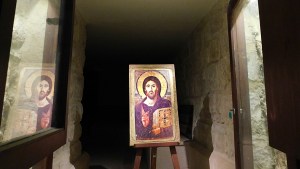Peter’s question: Lord, if my brother sins against me, how often must I forgive? The best way to answer: Put yourself in the place of that brother. How often would you want to be forgiven? Seventy times seventy gazillion.
Finding ourselves in forgiveness
Jesus is preparing Peter for his vocation as a forgiver. The Lord has already revealed to Peter, Whatever you declare bound on earth shall be bound in heaven; whatever you declare loosed on earth shall be loosed in heaven (Mt 16:19).
As we forgive those who trespass against us …. It is impossible to understand the Father’s love, it is impossible to be a sharer in the Father’s love, unless we commit to being forgivers. This is not some stricture but a privilege. By insisting on forgiveness, Jesus is letting us in on ourselves. Cardinal Joseph Ratzinger explained it,“Faith aims at leading man to recognize that he is a being that can only find itself in the reception and transmission of forgiveness.”
Absolve, absolve, absolve
There’s a moving example of this in an overlooked gem of a film titled Ushpizin. It tells the story of a poor Hasidic couple, Moshe and Mali, trying to scrape by in Jerusalem. As the Jewish holiday of Sukkot approaches, they lack the money to set up a sukkah: a temporary dwelling where families take their meals and abide for the seven days of the festival. But when a friend of Moshe discovers that David Gabay’s sukkah is going unused, he “appropriates” it for the couple, telling them that the sukkah is “nobody’s.” However, as soon as Moshe discovers that his sukkah is stolen, he seeks out its owner, mortified.
Moshe walks to the neighborhood of David Gabay, praying earnestly along the way, “Lord, I’m begging you, open Gabay’s heart to forgive me because I can’t take this test any longer! Forgiveness.” Moshe starts calling out in the street, “Gabay! David Gabay!” Gabay appears on a balcony. They discuss the situation. And Moshe asks directly, “You absolve me? You won’t bear a grudge?”
Gabay: No.
Moshe: Say it.
Gabay: Say what?
Moshe: That you absolve me.
Gabay: I absolve you.
Moshe: No, my good man. Say, “Absolved, absolved, absolved.” Say it.
At this, David Gabay breaks into a huge smile and laughs, and then cheerfully says, “Absolved, absolved, absolved” … and then laughs some more, good-heartedly, touched.
Moshe: You’ve made me very happy. If you only knew.
Gabay: Happy holiday, good man.
Moshe: [as he walks away] Forgiveness. Forgiveness.
The thing to notice is that, while Moshe elatedly receives forgiveness, it is David Gabay who comes alive in a whole new way.
Restoration and renewal
Why does there come to be such a dramatic change in the man who absolved another? Because, as Cardinal Ratzinger told us, “forgiveness is the restoration of truth, the renewal of being.” And that new life in the truth, that renewal of being is something palpable — we can see it and feel it. If we find ourselves lacking that restoration and renewal in our life, it may be because we are not forgiving enough.
But the plain fact is that we can forgive others, even if we don’t “feel” forgiveness toward an offender, because the power to forgive does not come from us; it is given. “Mercy is the only power that can face evil and not flinch, because it knows a Power stronger than evil,” says Dominican Fr. Simon Tugwell. “Love in our broken world can never be other than forgiveness.” And we have been shown that mercy. Mercy has made us his friend.
The world’s greatest realist
Restoration in the truth turns us courageous. “The prerequisite of forgiveness is the courage that springs from a deep sense of intimate security. The genuine pardoner actually is stronger than the fear-ridden hater” (Servant of God Romano Guardini).
The forgiver is the world’s greatest realist. For the forgiver admits their sin, realizes they need forgiveness they don’t deserve, is profoundly grateful for the mercy they receive, and lives obedient to that mercy, confronting the injustice, cruelty, and deceit of the world with forgiveness.
Later in Ushpizin, as Moshe and Mali celebrate the circumcision of the son they thought they would never have, their friends dance around the euphoric father. David Gabay is there as well, and as he dances, he keeps repeating the word that best expresses the overwhelming joy in his heart: “Absolved, absolved, absolved!”
~
Find Fr. Peter John Cameron’s reflection on the Sunday Gospel each week here.
And follow his series of brief reflections on prayer here.


